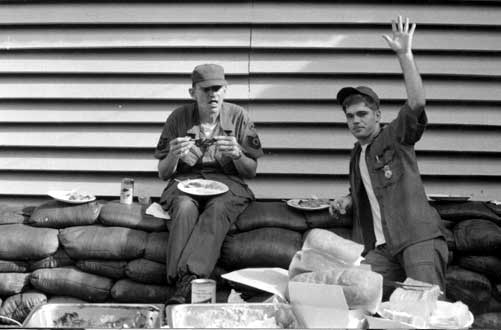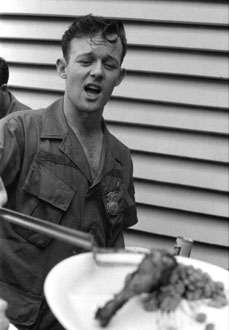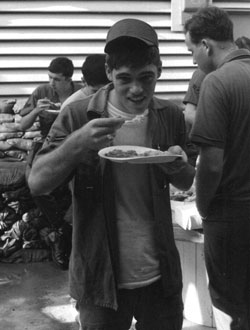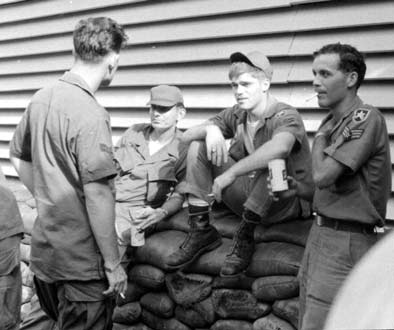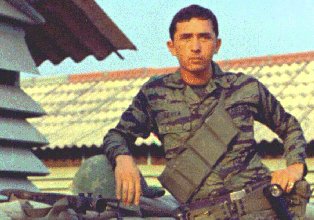3rd Combat
Security Police Squadron, Biên Hòa, November 1966-1967
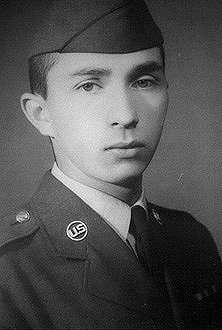 HOSPITALIZED
IN VIETNAM - Looking back over all those years, I marvel at the courage
of those men who were so very young, and yet so manly, for they endured
so much pain and suffering with never a single complaint."
HOSPITALIZED
IN VIETNAM - Looking back over all those years, I marvel at the courage
of those men who were so very young, and yet so manly, for they endured
so much pain and suffering with never a single complaint."
Early one night
at Biên Hòa, a handful of rockets slammed into the Air Base. It was
one of those rare nights when I was supposed to be off, but now the
attack obligated me to report for duty, even though I was somewhat
intoxicated. At the security police squadron area, there were day
shift troops congregating for deployment or standby. Some were standing
around in the dark talking with M16s shouldered, their faces glowing
from their cigarette drags. Others were breaking out ammo, flares
and hand grenades and loading them onto trucks.
A tech sergeant,
whose name I do not recall, asked me if I had been drinking. I told
him I was supposed to be off that night and that I had been drinking
quite a bit. He said they would try to avoid putting me on post, and
that perhaps I could soon be relieved of duty if there was no indication
of sappers in the wire. For that I was grateful, but soon after found
myself recruited to assist in loading ammo onto a truck. At one point,
perhaps because I had been drinking and my judgment was off, I loaded
a 120 pound box of M60 ammo onto a truck by myself. At the time I
weighed about 150 lb., but at nineteen, I was all muscle. Soon after,
however, I began to feel a burning sensation in my lower abdomen and
I knew what had happened. I had ripped open my old hernia. As small
child, I had fallen out of a tree while playing at a friend's house.
My mother took me to a doctor, who said I had sustained a hernia,
but that it was not serious enough for surgery. As I grew older, I
was only vaguely aware of it, and it never hindered me in sports or
any physical activity. When I took my physical exam to go in the Air
Force, it went undetected, and I gave it no thought. But now, something
I'll call guts continuously spilled out through the tear, and I constantly
had to push them back in.
I began to experience
considerable discomfort, and one day noticed that all my fatigue pants
had stains in the same spot from my dirty fingers continuously pushing
my guts back in. I knew I needed medical attention, but I wanted to
wait until I left Vietnam. I had been there long enough to suspect
that medical care in Vietnam would be no frills. As it turned out,
I was right.
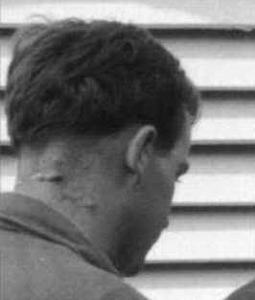 As
the days passed, I doubted more and more that I could wait until I
left Vietnam to have surgery. My greatest concern was that a situation
would arise in which I would not be able to do my duty. I knew I could
not lift and carry another man. I decided to seek counsel from my
good friend John Pettit, another security policeman. John was an outgoing
sort of guy, always quick with a joke or wisecrack. John had been
operated on by an Air Force surgeon stateside. I don't know how good
a job the surgeon did, but he left huge scars on the back of John's
neck (photo left), which I considered less than appearance enhancing.
To my surprise, John told me that he, too, had been contemplating
going to a doctor. He had a cyst on his lower back that needed to
be removed. I did not know what a cyst was, but he seemed to know
all about it. His greatest fear was that it would have roots. That,
he said, would mean they would have to cut deeper, and that could
cause some serious problems. We decided to go to the doctor together,
and selected a day later in the week.
As
the days passed, I doubted more and more that I could wait until I
left Vietnam to have surgery. My greatest concern was that a situation
would arise in which I would not be able to do my duty. I knew I could
not lift and carry another man. I decided to seek counsel from my
good friend John Pettit, another security policeman. John was an outgoing
sort of guy, always quick with a joke or wisecrack. John had been
operated on by an Air Force surgeon stateside. I don't know how good
a job the surgeon did, but he left huge scars on the back of John's
neck (photo left), which I considered less than appearance enhancing.
To my surprise, John told me that he, too, had been contemplating
going to a doctor. He had a cyst on his lower back that needed to
be removed. I did not know what a cyst was, but he seemed to know
all about it. His greatest fear was that it would have roots. That,
he said, would mean they would have to cut deeper, and that could
cause some serious problems. We decided to go to the doctor together,
and selected a day later in the week.
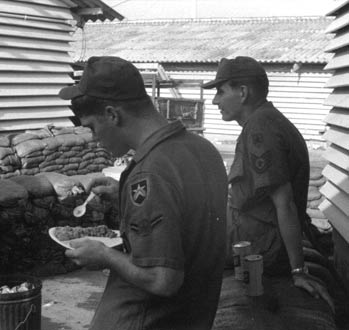 After
getting off duty that morning, we set out for the Air Force dispensary
on the east side of the base. I still had reservations about surgery,
and I anticipated that my condition would be explained to me and that
I would be given time to think it over and decide what to do. We were
not even sure we would be seen, since we had no appointments. But
I had forgotten that I was the property of the Air Force, and little
more than a tool that needed fixing. Consequently, we were quite surprised
when the doctor who examined us told us he was sending us to Long
Binh Army Base for surgery. I was more than a little concerned, but
John Pettit seemed to take it in stride. We asked that Tech Sergeant
Weeks, our Flight Commander, be notified. Sergeant Weeks was a hard
drinking, hard nosed NCO, but he was fair to his troops and not infrequently
showed that he had a soft spot in his heart for his men. We felt badly
that we had put Sergeant Weeks in a bind, he was suddenly short two
men.
After
getting off duty that morning, we set out for the Air Force dispensary
on the east side of the base. I still had reservations about surgery,
and I anticipated that my condition would be explained to me and that
I would be given time to think it over and decide what to do. We were
not even sure we would be seen, since we had no appointments. But
I had forgotten that I was the property of the Air Force, and little
more than a tool that needed fixing. Consequently, we were quite surprised
when the doctor who examined us told us he was sending us to Long
Binh Army Base for surgery. I was more than a little concerned, but
John Pettit seemed to take it in stride. We asked that Tech Sergeant
Weeks, our Flight Commander, be notified. Sergeant Weeks was a hard
drinking, hard nosed NCO, but he was fair to his troops and not infrequently
showed that he had a soft spot in his heart for his men. We felt badly
that we had put Sergeant Weeks in a bind, he was suddenly short two
men.
Because there
were beau coup VC in the area, we were never allowed off base unless
it was to conduct a sweep outside the perimeter. But that was just
an exercise in slogging through elephant grass and muddy water above
the knees, then returning to the base exhausted, muddy, wet and sweaty.
Now, in spite of the fact that we were to be hospitalized in a war
zone and operated on, we were looking forward to a new adventure.
Soon, we were
on a small bus going to Long Binh, some five kilometers away. Vietnam
was clearly a country at war. The road between Biên Hòa and Long Binh
was abundant without us Army and Vietnamese troops, trucks and weaponry.
Being without our M16s and ammo made us feel naked, but soon we arrived
at Long Binh, that sprawling Army base. We drove to the hospital,
passing combat and support troops of every kind. The facilities were
all of simple wood construction, lined up in neat rows with sandbag
walls surrounding them like at Biên Hòa, but here there was an abundance
of tanks, armored personnel carriers and other various implements
of war.
We arrived at
the hospital, and not knowing what to expect, I began to feel a little
anxious at the prospect of surgery. I wondered if it would be today.
As it turned out, it would not be for a week. We were taken to a Quonset
hut for registration, where we were issued a set of blue pajamas and
a brown paper bag in which to store our fatigues, boots and personal
belongings. After that we were shown to a couple of beds in a very
crowded ward. Our hospital ward was just another Quonset hut with
a row of beds lined up along each side and an aisle in the middle.
To my astonishment, the hut was air conditioned, and really, really
cool. I got into my blue pajamas and into bed. For awhile, I just
lay there looking around, adjusting to my new environment. All the
patients were young men. Many were like me, guys who had various aliments
or injuries from accidents. But a lot were men who had been wounded
in action. I was surprised at the high number of burn patients. They
all had curved metal band frames over them, so the sheets would not
touch their burned flesh, and which gave them the appearance of heads
sticking out of covered wagons.
Across, and
to the right of me was a young Hispanic man, who had been very badly
burned. Even his eyes had patches over them so he could not see. The
medics would spoon feed him and walk him to the latrine. It was a
long, slow, painful walk for him. Another patient told me he had been
the driver of an M113 armored personnel carrier (APC) that had been
hit with a B-40 rocket. "Charlie always aims for the front", he told
me, "That way they either hit the driver, or the engine, or both.
Either way, it comes to a stop." It made perfect sense. Yet, when
I had been the driver of an APC, that risk had never occurred to me.
Twice, surgery
for John Pettit and me was scheduled and then canceled to treat incoming
wounded. After about four days of lounging about, a doctor and a chubby
faced medic appeared at my bedside. I had been indulging myself in
what had become my usual reading and napping. By now, however, I was
struggling through Taylor Caldwell's romance novel. I had long since
lost interest in it, but in the belief that one must finish what one
begins, I continued to plow through it, even though it had become
laborious, if not outright penance. The doctor's OD fatigues showed
he was a major, and at his direction, I stood up. He was Hispanic,
with clean cut jet black hair. He poked and prodded the injured area,
then told me to report to such and such a place that evening to be
shaved. Surgery would be the next morning, he told me. By now I had
resigned myself to accept whatever occurred, so I told him I would
be there and thanked him. The whole examination lasted about 45 seconds.
No frills. I went back to my reading, but my mind kept turning back
to my impending surgery. Would everything go all right? Was this doctor
competent? What if we had a rocket attack during surgery? What if
we lost electrical power?
The
next two days were a heavenly bliss in that air conditioned paradise.
John Pettit (Photo, Left) and I were in awe by the luxury of it. For
the first time in months our skin was dry instead of hot and clammy.
There were a number of books on a table that some folks back home
had donated to hospitalized troops in Vietnam. With the antiwar protests
going on back home, it was good to see that there were still some
folks who cared about us. I doubted any came from the Fonda residence.
I picked out a book by Taylor Caldwell. It was a romance novel, more
suitable for a woman, but it was a voluminous work and I anticipated
having lots of reading time.
The first day
I napped and read, and napped and read some more. Meals were actually
brought to us in bed by the medics. I felt I didn't deserve such special
treatment. After enduring months of hardship, these simple acts of
kindness were overwhelming, and almost enough to make one weep. That
first day I slept so much, I thought I would be awake all night. I
was wrong. I slept like a log. The next day I read and napped some
more. At one point, I decided to exert myself, so I got some paper
and a pen, and wrote a letter home. I told my mother and father and
sisters and brother about my situation, and that I was certain everything
would be all right. Of course, I did not know how things would turn
out, but what could I do? I was well past the point of no return.
That night I slept like a dead man, like one who had been deprived
of sleep for months and months, which I had.
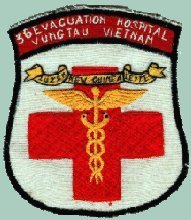 The
next day, John Pettit and I were told we were being sent to Vũng Tàu
for surgery. We were told we had only been at Long Binh while they
made room for us at Vũng Tàu. We were told to gather our things and
prepare to move out. An hour or so later, John and I and several others
were put on a bus and driven back to Biên Hòa to board a C-130 for
Vũng Tàu. At Biên Hòa AB, I wondered if I would see anyone I
knew. I began to feel guilty. Here, while my comrades-in-arms had
been trying to sleep in a hot humid environment with jet aircraft
taking off and landing all day, and then trying to be awake and alert
during the night in a state of exhaustion, I had been shamelessly
indulging myself in the most decadent cornucopia of luxuries. I found
myself slinking down in my seat and leaning away from the window.
No one saw me.
The
next day, John Pettit and I were told we were being sent to Vũng Tàu
for surgery. We were told we had only been at Long Binh while they
made room for us at Vũng Tàu. We were told to gather our things and
prepare to move out. An hour or so later, John and I and several others
were put on a bus and driven back to Biên Hòa to board a C-130 for
Vũng Tàu. At Biên Hòa AB, I wondered if I would see anyone I
knew. I began to feel guilty. Here, while my comrades-in-arms had
been trying to sleep in a hot humid environment with jet aircraft
taking off and landing all day, and then trying to be awake and alert
during the night in a state of exhaustion, I had been shamelessly
indulging myself in the most decadent cornucopia of luxuries. I found
myself slinking down in my seat and leaning away from the window.
No one saw me.
[Left: Patch of the 36th Evacuation Hospital Vũng Tàu Vietnam
1965-1969]
We boarded the
C-130 and flew to Vũng Tàu without incident, and were then taken to
the hospital. The hospital was a long row of huts lined up end to
end, with a few huts that ran perpendicular to the long row. Those
huts were occupied by Vietnamese men, women and children who had sustained
every type of wound and injury imaginable. Of the men, some were military,
some were civilian. American amputees and those with life threatening
wounds were evacuated out of the country pretty quickly. Not so for
these Vietnamese. Between the row of huts where American patients
were cared for, were some wooden chairs which were usually bedecked
with patients in blue pajamas. Along the row of huts ran a long narrow
sidewalk that led to the chow hall at the end of the row. We were
taken to the hut at the very end of the row. It was quite different
from the rest. Except for a row of benches on each side, it was pretty
bare and empty. As I recall, there was no wall at one end. Outside,
there were two helicopter landing pads. Obviously, this was a place
where wounded from the battlefield were brought in to receive preliminary
treatment.
We were told
to sit on the benches along the wall and given pencils and a form
to fill out for registration. I sat next to a young man who cradled
his right arm across his stomach. His slender frame and freckled baby
face made him look not a day over fifteen. When he got his form, he
casually told the medic. "I can't fill this out." "Why not?" asked
the medic suspiciously. "Because," said the young man, "I got shot
in the chest. My shoulder blade's shattered." "All right" said the
medic, sounding a little annoyed, "I'll fill it out for you." In response
to the medic's questions, the young man gave his branch as "Army"
and his age as "eighteen." After we completed our forms, I asked the
young soldier, "How'd you get hit?" "Awww," he said, " We were on
patrol and went up to this village. It was supposed to be friendly,
but VC had moved in and they ambushed us. I was one of the first ones
to get hit." He went on to describe how he took an AK round in the
chest that knocked him down and stunned him. It took a moment to realize
he had been hit and that those red things flying above him were tracer
rounds from his own unit returning fire at the VC. At any moment he
anticipated being hit again, either by his own side or the VC, but
it never happened. Later, as he was being med-evaced out by helicopter,
he passed out and came to several times. He said "Every time I came
to, I could see the helicopter blade going whup, whup, whup, whup
over my head." After about the fourth time he asked himself, "Is this
going to be the last thing I see in my life, a helicopter blade whirling
over my head?" Many units had a young guy whose youthful face made
him look even younger, and was often called "the kid." This brave
young soldier was one of those "kids," but he was as manly as any
man I've ever met, and more so than many.
After registering,
we were assigned beds in a ward, or should I say hut. To my disappointment,
the huts were not air conditioned. But Vũng Tàu is a beach town, so
it was a little cooler than Biên Hòa, but not as cool as those heavenly
huts at Long Binh. I was just settling in, when another patient came
over and asked me, "What unit you with?" He was an old guy, probably
around twenty-eight. He had a wiry build and his brown hair was combed
in a slight pompadour, which made him look a little like a garage
band rock star. I identified my unit and he told me he was in the
Army. I do not remember the unit. He said he was a cook, and had been
in Vietnam for four years. As my mind struggled to understand why
a cook would want to spend four years in Vietnam, he asked me "What
you here for?" "Hernia operation" I said. "You're here for a hernia
operation?!?!," he asked wide eyed. "I had a hernia operation!!" he
said, and pulled his blue pajama pants down exposing a fresh, hideous
incision with black surgical thread hanging down and tied in a knot.
"It only hurts when you laugh," he said. "Oh, and please, please,"
he added, "don't sneeze." "I won't" I promised, and for the first
time, regretted having sought medical attention.
That day, I
began to get to know the other guys around me. On my right was a young
Marine who had taken shrapnel from a hand grenade in the buttocks.
"I ran past this NVA," he said with childlike wonderment. "I thought
he was dead and he threw a hand grenade at me." A couple of guys down
from him was a young Army troop whose hand was burned. During a fire
fight, he had grabbed the barrel of his M16, popped out an empty
clip, popped in a fresh one and continued firing. The web between
his index finger and middle finger was completely burned away. The
palm of his hand and his fingers were also badly burned. I had always
wondered what kind of burn one would sustain from a hot M16 barrel.
Now I knew, and it was not a pretty sight.
There was also
the usual array of burn patients, their heads sticking out of their
covered wagons. I was to learn that there are a thousand ways to get
burned in a combat zone. Across from me and down to my right three
or four beds, was a young Army troop whose finely chiseled facial
features gave him an aristocratic appearance. He was a perfect candidate
for a recruiting poster for any branch of the service. He had shot
himself in the foot with a .45 auto to avoid combat, and was facing
charges under the Uniform Code of Military Justice (UCMJ). I never
heard anyone criticize him or what he had done, but whenever he was
discussed, it was always in hushed tones, signifying his disgraceful
conduct. I do not believe there was a conspiracy to ostracize him,
but not one single time did I ever see another patient speak a single
word to him. He spent his days lying in bed staring at the ceiling,
not even making eye contact with anyone else. Only the medical staff
conversed with him, and then only briefly, as they were always too
busy to give any of us any more attention than the bare minimum we
might need. I now wish I had spoken to him. We were wrong to have
judged him.
One day, a young
Catholic priest came into the ward. The young Marine next to me who
had taken shrapnel in the buttocks, was Italian-American, and like
most Italians, Catholic. The priest stopped to chat with him. Early
in the conversation, the Marine told him flat out that he did not
want to go back into combat, and asked if there was any way he could
get out of it. Several of us turned our heads toward the priest to
see what he would say. It was an awkward moment. We understood how
the Marine felt, but knew his request was a dishonorable one. But
what the nineteen year old Marine had seen and experienced diminished
the importance of honor. He was asking that his life be spared. The
young priest's mouth fell open just a little, and his furrowed brow
reflected the sympathy he felt for the young Marine. Another sense
seemed to tug at him, reminding him of his obligations as a military
officer. "Well, yes," he said at length, "but not in anyway that you
would want." The Marine cast his glance downward. We all felt his
embarrassment. The priest's message was clear. He must go back and
do his duty. I have no doubt he did.
And about five
minutes before the appointed time to be shaved, I left my hut to go
to the appointed place. I knew it was about a five minute walk. On
my way to the appointed place, I decided to take a shortcut through
a Vietnamese ward. I passed by the bed of a young soldier who had
a large wound on the left side of his torso. It looked like much of
his skin had been blown or burned away. Like most Vietnamese, he was
skinny, and I could see exposed ribs in some places. A Vietnamese
nurse was working on him and she seemed to be cutting away dead flesh
from his ribs. People of different languages express pain differently.
Americans tend to say "OW!!" or "OUCH!!" The Vietnamese say "Ooo Yaiiii!!"
This soldier with his face distorted in pain kept saying over and
over again "Ooo Yaiiii!!, Ooo Yaiiii!!"
I found the
room in which I was to be shaved and subsequently operated on, and
the medic who had accompanied the doctor earlier in the day told me
to lie down and pull my pajama bottoms down. I did as he said, and
he proceeded to sharpen a straight razor on the inside of a leather
strap. It reminded me of how my dad used to shave when I was a child.
He squirted some Physohex surgical soap on me, and like a fencer wielding
a sword, shaved me in just a few seconds. He handed me a roll of toilet
paper, told me to wipe myself off and go take a shower. No frills.
He told me they would come for me in the morning after I had been
given an injection. I took a shower and counted fourteen nicks and
cuts where I had been shaved. No frills.
The next morning,
a medic came and gave me a shot, and shortly thereafter he and another
medic came for me with a gurney. I could not understand why I could
not just walk, until I stood up and felt the effects of the drug.
They told me to leave my pajama shirt. I took it off and threw it
down. It seemed to float endlessly and beautifully before it landed
gently on the bed. I lay down on the gurney and they floated me away
to the operating room.
The medic who
had shaved me the night before was making preparations. "What side
is it on?" he asked. Even in my drugged state, I was surprised by
his question. "It's right here," I said, pointing to the spot. I visualized
myself waking up to find two incisions, one on the left side, where
they had opened me up and found everything okay, and one on my right
side, where they had opened me up and found the hernia. Then I visualized
myself waking up and finding incisions all over my body. Deciding
the medic needed supervision, I propped myself up on my elbows. "Hey!"
he said, "Lie down, you're going to pass out any second now!"
Far, far away
I heard an angel's voice softly calling my name through a misty fog.
"Ernest... Ernest... Ernest." As I struggled to pull myself out of my
drugged stupor, I felt I was coming back from death itself. I opened
my eyes and saw a nurse holding my hand and calling my name. She was
no stone fox, but it had been months and months since I had heard
a round eyed girl call my name, and now it was so wonderful. When
she saw I was awake, she got up and walked away. No frills.
The operation
was over, and there was a dull but growing pain where my hernia had
been. I was taken back to my ward and put in bed, where I promptly
fell asleep. When I awoke it was dark outside. I was hungry, in pain,
and I had to urinate. I didn't feel I could get out of bed, let alone
make it to the latrine. I felt as though someone had cut me open,
sewn up some muscles inside, and then sewn me up on the outside. I
pushed the sheet off myself and examined the incision. It was a fresh
cut with surgical thread hanging out and tied in a knot. After a while,
a nurse came walking by. I knew she would have an answer to my dilemma.
I called her over. "I just had a hernia operation today," I said,
"and I need to go to the latrine." "Oh... " she said hesitantly, as
though pondering my comment, "Well, go ahead" she said and walked
off. I reminded myself that thousands of wounded had come and gone
through this hospital. There had been burn patients, and patients
with shrapnel wounds and high velocity bullet wounds. There had been
amputees and many deaths. There was no sympathy to be wasted on someone
who had merely had a hernia operation. I made a mental note to ask
for nothing unless I absolutely needed it and absolutely could not
get it myself. That never happened. I began to raise myself up slowly,
testing my strength and measuring my pain. I felt extremely weak.
It took a while, but I finally got out of bed. I could not straighten
up, so bent over, I slowly walked out the door. After walking a few
feet from the hut, I broke out in a cold sweat and had to stop and
lean against a sandbag wall. I began to doubt I could make the other
seventy feet to the latrine and I felt my strength seeping out of
me. After a few minutes, I walked off to the side where I was certain
no one would step and relieved myself. I made it back to my bed and
fell asleep. The next day I was brought meals in bed. John Pettit
came by a couple of times to see how I was doing and poke fun at me.
I was feeling pretty weak and John very considerately didn't stick
around long when he saw I was not up to much conversation. After that
first day, it was up to me to walk to the chow hall about one hundred
yards away. For two days I limited myself to lunch only. The other
two meals were not worth the pain and effort. There was an Army troop
who took to hanging around with John Pettit and me. I do not remember
his name or nature of his wound, except that it did not affect his
ability to walk. He and John would walk ahead of me to the chow hall
and then John would stop and say "Awww... let's wait for Grandpa,
COME ON GRANDPA, HURRY UP." I would come walking up bent over and
when I caught up with them, they would turn and start walking at their
normal pace and immediately leave me behind again.
Over the next
few days, John Pettit and I and our Army buddy would sit and relax
in some lawn chairs outside. We whiled away the days, lounging about,
engaged in idle chatter about the war and what life would be like
when we got back home. We soaked up the sun, while above us huge fluffy
white clouds hung in the air just beneath a deep blue sky. It was
during this time that Pettit and I fell into a habit which to this
day humbles me with shame.
There was a
Vietnamese boy about nine years of age who had been severely burned
by napalm over his entire chest and stomach. His nipples were completely
gone, and it was impossible to discern where they had once been located.
Considering napalm's adhesive and self-igniting qualities, it was
a miracle he was alive. Looking back, I realize that some Vietnamese
must have exerted a super human effort to save this boy from death
by fire. Napalm burns are different from other burns. Most burn patients
had a smooth sheet of bright red where their skin had once been. But
napalm burns craters and valleys and crags in the skin, which can
only result in ugly scaring. That's how this boy was. He never wore
a stitch of clothing and he was the pet of the head nurse, an Army
captain whose husky build and short cropped blond made her look like
a German battle-ax. Pettit and I would summon the boy over. "BABYSAN,
BABYSAN!!! LAI DAE, LAI DAE!!!" (come here, come here)." We would
signal with a downward movement of the hand, for to call a Vietnamese
with an upward movement as we do, is an insult, as that is how one
summons a dog. We could see that he was afraid of us. Nonetheless,
in spite of his fear, or perhaps because of it, he would come over.
We would then look at him up and down frowning and say "Oh babysan,
oh babysan, napalm numba ten, huh babysan?" We would then burst out
laughing.
I am ashamed
of my behavior of thirty years ago. I feel as though it was another
person who did that. All I can say is that after months of witnessing
pain, suffering, death and mourning, we were inured to what one considered
low level suffering, and a small boy with a hideous wound covering
half his body, was but one more casualty and hardly worth a second
glance. In such an environment, one either adjusts, even if it means
becoming numbed, or goes insane. Most GIs instinctively opted for
the former. Others could not or would not and suffered the consequences.
Most of us are probably somewhere in between.
About six days
after surgery, two doctors appeared at my bedside and asked me to
stand up so they could examine my incision. I stood up and pulled
my pajama bottoms down. "What the heck is that?" one doctor asked.
"Oh... " said the other, "That's Doctor so and so's mark, he
always ties his surgical threat in a knot like that." For the first
time, I realized my doctor had artistic qualities. After a few pokes
and prods and questions about pain and my ability to walk, I'm told
that I'm being sent to Cam Rah Bay for recuperation. The next day
I gathered my things and went to say good-bye to John Pettit. I found
him in a chair with our Army buddy, his bright blue eyes twinkling
through his tanned skin. He seemed to be thoroughly enjoying his vacation
and went on and on at great length, telling me how terribly sorry
he was that he would not be returning to duty as soon as I. He told
me to say hello to the SPs back at Biên Hòa, and to tell them how
much he regretted not being able to be with them, struggling to stay
awake all night and struggling to sleep during the day in a hot, humid
noise filled environment. I told him I would pass his regrets along
and bid him and the soldier farewell, then went to join some other
patients boarding a bus that would take us to a C-130 at the airport.
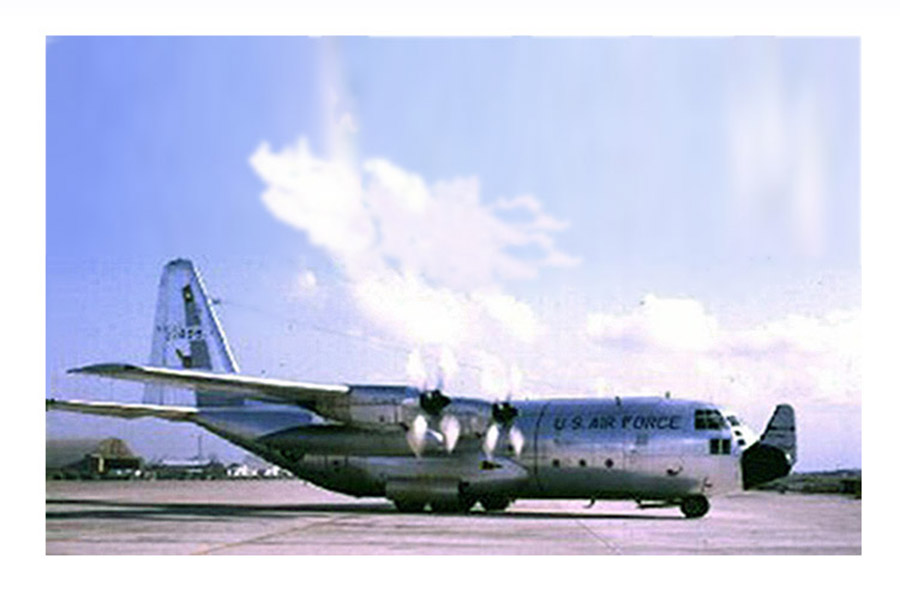 Those of us who could walk boarded the C-130 first and sat on the web seats
on the side of the fuselage. The heat inside the aircraft was intense,
and soon we were all perspiring. The medics then began bringing on
the stretcher cases one at a time, four men to a stretcher. It didn't
look like they did this every day, and I wondered when they would
drop someone. Each stretcher was locked in place in a rack. At one
point, as they tried to maneuver a stretcher in place at head level,
one medic began to lower his side before the others. The patient began
to slide out and reached up and grabbed the rack, his face contorted
in pain. I found the exercise strenuous on my incision, and I could
hear an occasional grunt or moan from other patients whose wounds
were being aggravated by the movement. Others winced or grimaced as
they moved or settled in the web netting. At no time however, did
a single man complain. As always, we accepted our situation. Most
of us were just kids. Many, like me were just teenagers. But in some
ways we were like old men. After every one was aboard, the ramp was
lifted and closed and we rolled out to the runway.
Those of us who could walk boarded the C-130 first and sat on the web seats
on the side of the fuselage. The heat inside the aircraft was intense,
and soon we were all perspiring. The medics then began bringing on
the stretcher cases one at a time, four men to a stretcher. It didn't
look like they did this every day, and I wondered when they would
drop someone. Each stretcher was locked in place in a rack. At one
point, as they tried to maneuver a stretcher in place at head level,
one medic began to lower his side before the others. The patient began
to slide out and reached up and grabbed the rack, his face contorted
in pain. I found the exercise strenuous on my incision, and I could
hear an occasional grunt or moan from other patients whose wounds
were being aggravated by the movement. Others winced or grimaced as
they moved or settled in the web netting. At no time however, did
a single man complain. As always, we accepted our situation. Most
of us were just kids. Many, like me were just teenagers. But in some
ways we were like old men. After every one was aboard, the ramp was
lifted and closed and we rolled out to the runway.
Once there,
the engines were shut off. We were all wet with sweat. An eternity
later, a crew member informed us we had mechanical trouble and that
a maintenance crew was coming out to fix the aircraft. Mercifully,
the ramp was dropped and those who could walk were allowed to deplane.
I was in pain, but the heat drove me out of the aircraft , and we
sought shelter from the sun under the wings. The occasional breeze
was pure luxury. I felt sorry for those still inside the aircraft,
the stretcher cases and those whose pain would not allow them to move.
After awhile,
a pickup truck loaded with half a dozen well tanned, hatless and in
some cases, shirtless mechanics came out at high speed and screeched
to a halt next to the aircraft. Jumping out of the back of the truck,
they cracked jokes and made snide remarks to each other. They seemed
like a wild bunch. Tools in hand, they went to work on the aircraft,
and after just a few minutes jumped back in their truck and with hardly
a word to the crew chief, took off again at high speed. I hoped their
appearance was deceiving, and that they were really very competent
mechanics. Apparently they were, for we took off and landed safely.
At Cam Rah Bay
the hospital was not air conditioned. I concluded Long Binh was the
exception to the rule. I was assigned a bed and I climbed into it.
The strain of the day's travel had increased my pain considerably
and I spent the rest of the day in bed. After I had been there a couple
of hours, they brought a fat black Army sergeant and plopped him in
the bed next to me, face down. All the skin on his back had been burned
off, and he had a urine bag attached. He had a roll of fat on each
side above his waist, and I could see that the skin in the folds had
not burned. For two days he was so drugged, he was hardly conscious.
A nurse would come over, and with what looked like a large Popsicle
stick, apply a white paste to his burn. After two days he got out
of bed, and still heavily drugged, stood at the foot of his bed holding
his half filled urine bag by the handle. To my amazement, he stood
there for a long time with his eyes closed rocking back and forth.
I wondered if he would fall. I hoped he would fall forward rather
than backward onto his wound. After awhile, he got back in bed, and
I asked "What happened to you Sarge?" "Oh... " he said, "I'm, in artillery,
and we put some powered charges in a hole to burn them." He went on
to tell me that the powder ignited prematurely and everyone turned
and started running. The blast of fire hit him on his back and he
was not wearing a shirt. He was in a lot of pain. We chatted a bit,
but he was still doped up and soon fell asleep.
This hospital
had the usual array of wounded by bullet, shrapnel and fire, and I
have to admit, at times I felt my hernia was but a scratch. Looking
back over all those years, I marvel at the courage of those men who
were so very young, and yet so manly, for they endured so much pain
and suffering with never a single complaint.
While not immune
to rocket attack, the area around Cam Rah Bay was patrolled by the
ROK White Horse Division, and everyone knew it was the policy of White
Horse to take no prisoners. Consequently, I felt quite secure. I had
seen these Koreans at Biên Hòa with their big, square, shaved heads,
and I knew immediately I would not want to be left to their mercy,
for there was none to be had.
By now, I knew
my days of hospitalization were dwindling and that I would soon be
back on duty, so I took it pretty easy, giving my injury as much opportunity
as possible to heal. Little did I know what awaited me my first night
back. After about five days I was examined by a doctor, who cut away
my surgical thread. He had a grandfatherly appearance about him and
a cheerful disposition. He told me he was discharging me the next
day. "Don't lift anything over five pounds for two months," he said.
I thought of my ammo laden web belt, pistol, M16, flak vest, canteen,
helmet etc., and thought there was no point in discussing it. "Yes
sir," I said. He gave me a cheerful smile, nodded and walked off.
The next morning,
I dressed in my fatigues for the first time in three weeks and was
discharged from the hospital. I was told where I could catch a bus
to the air terminal, and I walked over and stood there. It had been
two weeks since I had had surgery, and even though I could now stand
erect, I felt as sturdy as an egg. Off to my right, a few thousand
feet in the air, some airborne troops were jumping out of a C-130.
I don't remember why now, but something told me they were Vietnamese
troops. Judging by their proximity and the absence of gunfire, I concluded
it was a practice jump. Watching their parachutes unfurl in the blue
sky reminded me that a war was still going on, and that I would be
joining it that night
I arrived at
the air terminal, which as I recall was like other terminals in Vietnam,
that is a slab of concrete 150 feet by 150 feet with no walls and
a tin roof supported by thin columns. The floor was covered with GIs,
mostly Army troops. They were standing, sitting and lying about, many
smoking cigarettes. They were all in fatigues, and most of them were
laden with various types of weaponry, gear and ammo. Most were engaged
in conversation creating quite a din.
I caught a C-130
to Biên Hòa and walked to the Law Enforcement area where I informed
the day shift desk sergeant that I had just returned from the hospital.
I wanted to make it up to Sergeant Weeks for my abrupt departure,
and planned to report for duty that night, even though I knew I would
be dog tired and in pain. I went to my hut where most of my comrades-in-arms
were sleeping or trying to sleep. Trying to not make noise, I was
selecting a clean uniform for the night, when a day shift SP appeared
at my bunk and said, "Govea, Sergeant Weeks says you WILL work tonight!"
I was annoyed that I was being ordered to work before I could volunteer.
Without turning around, I replied with a quiet "Of course." The airman
stood there as though expecting me to say something more. When I didn't,
he left. I guess Sergeant Weeks was still a little sore.
After a while,
I undressed and got in bed. I kept my knees bent to minimize the pain,
and tried to sleep, but the anticipation of going on duty that night
kept me awake all day. That evening, I got up and socialized with
my follow SPs. I gave them John Pettit's message, and some chuckled
but others saw little humor in it. I told them about some of the wounded
I had seen in the hospitals and some of them shook their heads. Even
those who had not yet seen dead and wounded close up had been through
many rocket attacks, and seeing a rocket explode made it easy to surmise
what hot metal moving at high velocity could do to soft flesh and
tissue. As for the Vietnamese patients at Vũng Tàu, they had all seen
spookies and cobras pouring fire from the sky. They had seen, heard
and felt B-52 raids, and had watched napalm burn. It was not intellectually
challenging to imagine what effect that weaponry had on human bodies,
and what they had seen fit well with my descriptions.
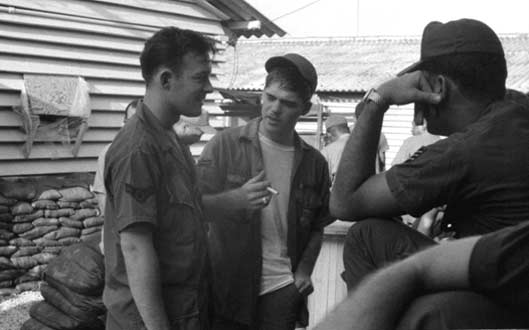 Early that night, I reported for duty (as ordered) and Sergeant Weeks,
perhaps wishing to express some sympathy for my condition, assigned
me to vehicle patrol so I could "sit down." For this I was grateful,
for it meant it would be easier to stay awake. My patrol partner was
Staff Sergeant Phillips, a big guy, some six foot three. Phillips
and I had worked together on the Security side and knew each other
quite well. After Guardmount, we climbed into our jeep and took off.
Early that night, I reported for duty (as ordered) and Sergeant Weeks,
perhaps wishing to express some sympathy for my condition, assigned
me to vehicle patrol so I could "sit down." For this I was grateful,
for it meant it would be easier to stay awake. My patrol partner was
Staff Sergeant Phillips, a big guy, some six foot three. Phillips
and I had worked together on the Security side and knew each other
quite well. After Guardmount, we climbed into our jeep and took off.
(Photo, right-left: Tom Trombly, Don Lee, Sgt Phillips)
Phillips had a weakness for the beauty of the Asian woman, and everyone
knew the best looking girls worked at the officers club. I'm certain
it was mere coincidence that they all ended up there rather
than the NCO or Airmen's Clubs. We knew when they got off work, and
Phillips decided we should go watch them to ensure their safety. As
they were coming out, we received a call from the Law Enforcement
desk, telling us that an intoxicated Army troop had a medic cornered
with a broken bottle at the Army's dispensary on the other side of
the base.
We knew we had
to get there fast. Phillips started the jeep and we took off at high
speed. Too high as it turned out. It had rained that day and the roads
were slick. As we traversed a wide curve, our jeep went out of control.
We began to turn to the left and go sideways. Those jeeps had no seat
belts, and accidents tended to result in serious injury or fatalities.
At some point Phillips hit the brakes, locking the wheels. I grabbed
the sides of my seat, determined to hang on no matter what. I prepared
to bend my body forward when the jeep flipped over to avoid being
crushed. I accepted the fact that my injury would be ripped open.
The jeep did
a complete 360 degree turn, but did not flip over. That old reliable
workhorse had served the GI well again. We ended up way off the road.
I took a moment to thank the Big Commander upstairs, then jumped out
and ran back to pick up our fatigue caps that had blown off by the
force of the turn. I ran back to the jeep, gave Phillips his hat and
put my own on and we took off again at high speed.
Upon arrival
at the dispensary, we jumped out of the jeep and ran inside. There,
we found not a drunken soldier holding a medic cornered with a broken
bottle, but rather, a drunken soldier wearing nothing but fatigue
pants, standing in a corner, holding a bottle of glucose in each hand
over his head, and threatening to smash anyone's head who approached
him. His shaggy blond hair made him look more like a derelict, than
a soldier in Vietnam. Seated on a stool in the center of the room
was another soldier with a badly infected and swollen index finger.
Further back were two Army medics standing with their arms folded
across their chests, calmly observing the whole thing. Phillips turned
to give me instructions, but I was already charging forward. Phillips
came up behind me. We each grabbed a bottle out of his hands, dropped
them down and grabbed the soldier by his arms. We pushed him forward
on top of a table and twisted his arms behind his back and handcuffed
him. We pushed him back up against a wall where there was a long bench.
His back hit the wall, he slid down and hit the top of the bench which
fell forward and turned upside down. He crashed down on top of the
underside of the bench and just lay there.
We turned our
attention to the medics, who informed us that the two troops had come
in seeking medical attention for the infected finger. The drunken
troop suddenly, and with no apparent reason, became disorderly and
grabbed the two bottles of glucose, threatening to kill anyone who
approached him. Sergeant Phillips asked the two medics if they would
come down to the Law Enforcement office to make statements, and they
said they would.
Phillips and
I got the drunken soldier to his feet and began walking him out of
the building. I reminded myself that if anything happened, my first
priority would be to protect my injury. As we walked out the troop
began cursing us, calling us Air Force wimps (or some such
word). As we walked him down a hallway, he continued calling us every
vile vulgarity his brain could conjure up. When we got him to the
jeep, Phillips turned him around and pushed his back up against the
jeep. He then began pounding the soldier's midsection with his large
fists. I unsnapped my club holder, and gripping my club at both ends,
used it like a battering ram, striking the right side of his rib cage
several times. Each time the soldier fell forward, Phillips pushed
him back up and we resumed our work. The soldier's curses were replaced
with grunts and groans. Phillips then pushed the passenger seat forward
and literally threw the soldier into the back. It was not a very neat
job. Somehow, his head ended up between the two front seats.
Just then another
security police jeep came pulling up. "Go get the other one," Phillips
told me, and went to talk to the other two security policemen. I went
back into the building, my adrenaline still going. When the soldier
saw me come in with my club in hand and fire in my eyes, I saw a wave
of fear sweep over him. He might not have been so scared if he had
known I had just had surgery two weeks earlier. I grabbed his arm
and said, "Lets go!" As we were walking down the hallway, I clutched
his left shirt sleeve and pushed him with my club stuck in his back,
still mindful of my injury. Suddenly, he tried to duck into a latrine.
"GET OUT OF THERE!" I shouted, and pulled him out. I pushed him out
of the building and over to the security police jeep."
Phillips and
the other two SPs were still standing there talking. I lifted the
passenger seat forward and told him to get in the back and stay there.
He climbed into the back seat, but left his feet too far forward.
"PULL YOUR FEET BACK!," I shouted. To my amazement he did not move.
"PULL YOUR FEET BACK!," I shouted again. He did not move. I slammed
the seat down on his ankles and he jerked his feet back. I walked
back to our jeep, and Phillips and I climbed in and we took off. The
soldier's head was still between the seats. All the way back the soldier
shouted mindless nonsense.
When we arrived
at the Law Enforcement office, Phillips got out and said, "Bring him
in." I wanted to remind him that I had just been discharged from a
hospital twelve hours earlier, but, not wanting to appear like a whiner,
I bit my tongue. I pushed the passenger seat forward, grabbed the
soldier's pants cuffs, and being careful to stay out of kicking range,
swung his legs out. I pulled him out of the jeep and took him inside.
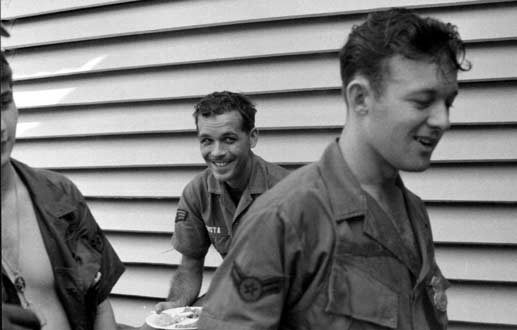 Upon
walking in, I saw Tech Sergeant Weeks and Captain Brown, our OIC,
leaning against the counter, behind which sat Sargeant Costa (photo
left-right: Unknown, Sgt Costa, Tom Trombly), our desk sergeant and
A3C Tom Trombly, our desk clerk. As soon as we walked in, Sergeant
Weeks rushed forward and pushed me out of the way. He grabbed the
soldier by his right arm and began pounding his stomach. I assumed
Phillips had told them what the guy thought of us Air Force wimps.
Captain Brown remained in the same position, arms folded, legs crossed
and eyes half closed. After several blows, the man was taken to a
cell. By now Phillips had told Trombly what the soldier thought of
us, and Trombly decided to take a turn at him. Although Trombly was
the desk clerk, his responsibility was to subdue the rowdies we arrested,
and he was flawless at his job.
Upon
walking in, I saw Tech Sergeant Weeks and Captain Brown, our OIC,
leaning against the counter, behind which sat Sargeant Costa (photo
left-right: Unknown, Sgt Costa, Tom Trombly), our desk sergeant and
A3C Tom Trombly, our desk clerk. As soon as we walked in, Sergeant
Weeks rushed forward and pushed me out of the way. He grabbed the
soldier by his right arm and began pounding his stomach. I assumed
Phillips had told them what the guy thought of us Air Force wimps.
Captain Brown remained in the same position, arms folded, legs crossed
and eyes half closed. After several blows, the man was taken to a
cell. By now Phillips had told Trombly what the soldier thought of
us, and Trombly decided to take a turn at him. Although Trombly was
the desk clerk, his responsibility was to subdue the rowdies we arrested,
and he was flawless at his job.
At nineteen,
I was young and aggressive, unafraid of a fight. But I knew whom not
to fight, and there was no way I would have ever fought Tom Trombly.
It was not that he was a little bigger and huskier than me--size comes
in third, after willingness and ability to fight. Rather, it was because
Trombly had plenty of the first two qualities. Tom went in and removed
the handcuffs from the soldier. Even from the desk area, I could hear
the sounds of fists smacking against bare flesh followed by grunts,
groans, feet scuffling and the sound of a body hitting a wall. By
now I was beginning to feel that enough was enough. Phillips then
went in for a discussion with the soldier. The objective was to get
him to admit he was the wimp (or some such word). "I guess I am a
wimp," I heard him say.
At this point,
the two medics arrived with a friend of the soldier. We allowed them
into his cell, and I could hear the prisoner raising his voice: "THEY
BEAT THE TAR OUT OF ME!!!" "Well, if you were acting the way you are
now," said his buddy, "I would have done the same thing."
"I doubt it,"
I said under my breath.
Sometime in October,
two or three weeks after my 20th birthday, I received a letter from
John Pettit that left me shaken. He had had his cyst-surgery, and
things had not gone well. They had not gotten everything out, and
were going to have to cut him open again. This was not the same John
Pettit I had left at Vũng Tàu: that John Pettit was laughing, joking,
smiling, enjoying himself, his blue eyes twinkling in his tanned face;
this John Pettit was confined to his bed, and unable to walk. He needed
help in going to the latrine. He was depressed, in pain, and fearful
of the future. I wrote him a letter back, admonishing him for behaving
like a school girl. I told him that of course he would be okay. The
doctors would go back in, remove what was left, sew him up, and he'd
be up and around in no time. In reality, I had no idea how things
would turn out for him. But in those days we needed things to believe
in, and had only each other to lean on. I tried to give him courage
to face the future so he could survive psychologically, at least.
In early November
I rotated out of Vietnam, a very different man from the boy who had
arrived a year earlier. After a short leave I went to RAF Bentwaters,
in England. There, I pushed everything that was Vietnam into the deepest
recesses of my mind, where it stayed relatively undisturbed for many
years.
I never heard
back from John Pettit. I have never known what happened to him.
 HOSPITALIZED
IN VIETNAM - Looking back over all those years, I marvel at the courage
of those men who were so very young, and yet so manly, for they endured
so much pain and suffering with never a single complaint."
HOSPITALIZED
IN VIETNAM - Looking back over all those years, I marvel at the courage
of those men who were so very young, and yet so manly, for they endured
so much pain and suffering with never a single complaint." As
the days passed, I doubted more and more that I could wait until I
left Vietnam to have surgery. My greatest concern was that a situation
would arise in which I would not be able to do my duty. I knew I could
not lift and carry another man. I decided to seek counsel from my
good friend John Pettit, another security policeman. John was an outgoing
sort of guy, always quick with a joke or wisecrack. John had been
operated on by an Air Force surgeon stateside. I don't know how good
a job the surgeon did, but he left huge scars on the back of John's
neck (photo left), which I considered less than appearance enhancing.
To my surprise, John told me that he, too, had been contemplating
going to a doctor. He had a cyst on his lower back that needed to
be removed. I did not know what a cyst was, but he seemed to know
all about it. His greatest fear was that it would have roots. That,
he said, would mean they would have to cut deeper, and that could
cause some serious problems. We decided to go to the doctor together,
and selected a day later in the week.
As
the days passed, I doubted more and more that I could wait until I
left Vietnam to have surgery. My greatest concern was that a situation
would arise in which I would not be able to do my duty. I knew I could
not lift and carry another man. I decided to seek counsel from my
good friend John Pettit, another security policeman. John was an outgoing
sort of guy, always quick with a joke or wisecrack. John had been
operated on by an Air Force surgeon stateside. I don't know how good
a job the surgeon did, but he left huge scars on the back of John's
neck (photo left), which I considered less than appearance enhancing.
To my surprise, John told me that he, too, had been contemplating
going to a doctor. He had a cyst on his lower back that needed to
be removed. I did not know what a cyst was, but he seemed to know
all about it. His greatest fear was that it would have roots. That,
he said, would mean they would have to cut deeper, and that could
cause some serious problems. We decided to go to the doctor together,
and selected a day later in the week.
 After
getting off duty that morning, we set out for the Air Force dispensary
on the east side of the base. I still had reservations about surgery,
and I anticipated that my condition would be explained to me and that
I would be given time to think it over and decide what to do. We were
not even sure we would be seen, since we had no appointments. But
I had forgotten that I was the property of the Air Force, and little
more than a tool that needed fixing. Consequently, we were quite surprised
when the doctor who examined us told us he was sending us to Long
Binh Army Base for surgery. I was more than a little concerned, but
John Pettit seemed to take it in stride. We asked that Tech Sergeant
Weeks, our Flight Commander, be notified. Sergeant Weeks was a hard
drinking, hard nosed NCO, but he was fair to his troops and not infrequently
showed that he had a soft spot in his heart for his men. We felt badly
that we had put Sergeant Weeks in a bind, he was suddenly short two
men.
After
getting off duty that morning, we set out for the Air Force dispensary
on the east side of the base. I still had reservations about surgery,
and I anticipated that my condition would be explained to me and that
I would be given time to think it over and decide what to do. We were
not even sure we would be seen, since we had no appointments. But
I had forgotten that I was the property of the Air Force, and little
more than a tool that needed fixing. Consequently, we were quite surprised
when the doctor who examined us told us he was sending us to Long
Binh Army Base for surgery. I was more than a little concerned, but
John Pettit seemed to take it in stride. We asked that Tech Sergeant
Weeks, our Flight Commander, be notified. Sergeant Weeks was a hard
drinking, hard nosed NCO, but he was fair to his troops and not infrequently
showed that he had a soft spot in his heart for his men. We felt badly
that we had put Sergeant Weeks in a bind, he was suddenly short two
men.
 The
next day, John Pettit and I were told we were being sent to Vũng Tàu
for surgery. We were told we had only been at Long Binh while they
made room for us at Vũng Tàu. We were told to gather our things and
prepare to move out. An hour or so later, John and I and several others
were put on a bus and driven back to Biên Hòa to board a C-130 for
Vũng Tàu. At Biên Hòa AB, I wondered if I would see anyone I
knew. I began to feel guilty. Here, while my comrades-in-arms had
been trying to sleep in a hot humid environment with jet aircraft
taking off and landing all day, and then trying to be awake and alert
during the night in a state of exhaustion, I had been shamelessly
indulging myself in the most decadent cornucopia of luxuries. I found
myself slinking down in my seat and leaning away from the window.
No one saw me.
The
next day, John Pettit and I were told we were being sent to Vũng Tàu
for surgery. We were told we had only been at Long Binh while they
made room for us at Vũng Tàu. We were told to gather our things and
prepare to move out. An hour or so later, John and I and several others
were put on a bus and driven back to Biên Hòa to board a C-130 for
Vũng Tàu. At Biên Hòa AB, I wondered if I would see anyone I
knew. I began to feel guilty. Here, while my comrades-in-arms had
been trying to sleep in a hot humid environment with jet aircraft
taking off and landing all day, and then trying to be awake and alert
during the night in a state of exhaustion, I had been shamelessly
indulging myself in the most decadent cornucopia of luxuries. I found
myself slinking down in my seat and leaning away from the window.
No one saw me. Those of us who could walk boarded the C-130 first and sat on the web seats
on the side of the fuselage. The heat inside the aircraft was intense,
and soon we were all perspiring. The medics then began bringing on
the stretcher cases one at a time, four men to a stretcher. It didn't
look like they did this every day, and I wondered when they would
drop someone. Each stretcher was locked in place in a rack. At one
point, as they tried to maneuver a stretcher in place at head level,
one medic began to lower his side before the others. The patient began
to slide out and reached up and grabbed the rack, his face contorted
in pain. I found the exercise strenuous on my incision, and I could
hear an occasional grunt or moan from other patients whose wounds
were being aggravated by the movement. Others winced or grimaced as
they moved or settled in the web netting. At no time however, did
a single man complain. As always, we accepted our situation. Most
of us were just kids. Many, like me were just teenagers. But in some
ways we were like old men. After every one was aboard, the ramp was
lifted and closed and we rolled out to the runway.
Those of us who could walk boarded the C-130 first and sat on the web seats
on the side of the fuselage. The heat inside the aircraft was intense,
and soon we were all perspiring. The medics then began bringing on
the stretcher cases one at a time, four men to a stretcher. It didn't
look like they did this every day, and I wondered when they would
drop someone. Each stretcher was locked in place in a rack. At one
point, as they tried to maneuver a stretcher in place at head level,
one medic began to lower his side before the others. The patient began
to slide out and reached up and grabbed the rack, his face contorted
in pain. I found the exercise strenuous on my incision, and I could
hear an occasional grunt or moan from other patients whose wounds
were being aggravated by the movement. Others winced or grimaced as
they moved or settled in the web netting. At no time however, did
a single man complain. As always, we accepted our situation. Most
of us were just kids. Many, like me were just teenagers. But in some
ways we were like old men. After every one was aboard, the ramp was
lifted and closed and we rolled out to the runway.
 Early that night, I reported for duty (as ordered) and Sergeant Weeks,
perhaps wishing to express some sympathy for my condition, assigned
me to vehicle patrol so I could "sit down." For this I was grateful,
for it meant it would be easier to stay awake. My patrol partner was
Staff Sergeant Phillips, a big guy, some six foot three. Phillips
and I had worked together on the Security side and knew each other
quite well. After Guardmount, we climbed into our jeep and took off.
Early that night, I reported for duty (as ordered) and Sergeant Weeks,
perhaps wishing to express some sympathy for my condition, assigned
me to vehicle patrol so I could "sit down." For this I was grateful,
for it meant it would be easier to stay awake. My patrol partner was
Staff Sergeant Phillips, a big guy, some six foot three. Phillips
and I had worked together on the Security side and knew each other
quite well. After Guardmount, we climbed into our jeep and took off. Upon
walking in, I saw Tech Sergeant Weeks and Captain Brown, our OIC,
leaning against the counter, behind which sat Sargeant Costa (photo
left-right: Unknown, Sgt Costa, Tom Trombly), our desk sergeant and
A3C Tom Trombly, our desk clerk. As soon as we walked in, Sergeant
Weeks rushed forward and pushed me out of the way. He grabbed the
soldier by his right arm and began pounding his stomach. I assumed
Phillips had told them what the guy thought of us Air Force wimps.
Captain Brown remained in the same position, arms folded, legs crossed
and eyes half closed. After several blows, the man was taken to a
cell. By now Phillips had told Trombly what the soldier thought of
us, and Trombly decided to take a turn at him. Although Trombly was
the desk clerk, his responsibility was to subdue the rowdies we arrested,
and he was flawless at his job.
Upon
walking in, I saw Tech Sergeant Weeks and Captain Brown, our OIC,
leaning against the counter, behind which sat Sargeant Costa (photo
left-right: Unknown, Sgt Costa, Tom Trombly), our desk sergeant and
A3C Tom Trombly, our desk clerk. As soon as we walked in, Sergeant
Weeks rushed forward and pushed me out of the way. He grabbed the
soldier by his right arm and began pounding his stomach. I assumed
Phillips had told them what the guy thought of us Air Force wimps.
Captain Brown remained in the same position, arms folded, legs crossed
and eyes half closed. After several blows, the man was taken to a
cell. By now Phillips had told Trombly what the soldier thought of
us, and Trombly decided to take a turn at him. Although Trombly was
the desk clerk, his responsibility was to subdue the rowdies we arrested,
and he was flawless at his job.
